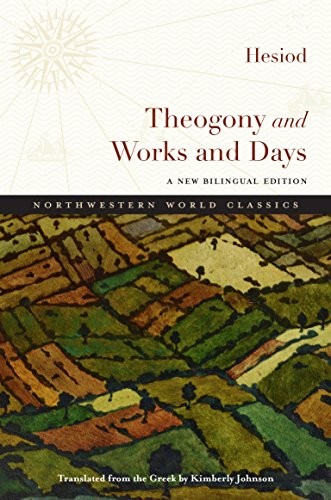Stephanie Jane reviewed Theogony and Works and Days by Hesiod
It's amazing to be able to read such an ancient text
4 stars
I love reading ancient work when I can find a good modern translation - the Epic of Gilgamesh, Beowulf - and Kimberly Johnson's work in translating Hesiod's two great poems here certainly fits the bill for me. It is amazing to think his words were originally spoken getting on for three millennia ago, yet in his ideas about how people should live in order to be in harmony with themselves and nature, Hesiod is surprisingly relevant - if I ignore his blatant misogyny of course!
Not being totally well-versed in Ancient Greek mythology, I did struggle to keep up with exactly who is who in Theogony. This poem namechecks, I think, all the Greek Gods and Goddeses Hesiod knew of, briefly referencing some of their stories, but obviously expecting an audience to already be familiar with every one. As a novice, I am now completely baffled by the pantheon, but …
I love reading ancient work when I can find a good modern translation - the Epic of Gilgamesh, Beowulf - and Kimberly Johnson's work in translating Hesiod's two great poems here certainly fits the bill for me. It is amazing to think his words were originally spoken getting on for three millennia ago, yet in his ideas about how people should live in order to be in harmony with themselves and nature, Hesiod is surprisingly relevant - if I ignore his blatant misogyny of course!
Not being totally well-versed in Ancient Greek mythology, I did struggle to keep up with exactly who is who in Theogony. This poem namechecks, I think, all the Greek Gods and Goddeses Hesiod knew of, briefly referencing some of their stories, but obviously expecting an audience to already be familiar with every one. As a novice, I am now completely baffled by the pantheon, but enjoyed Hesiod's poetic flow especially in the sections where he effectively just lists name after name after name. I was reminded of Tom Lehrer's Perodic Table song and wondered if these passages were structured as an aide-memoire as well as being fun to recite aloud (yes, I did!).
Works And Days concerns itself more with the practicalities of human life and meanders around a variety of subjects. As poetry, I was less impressed with this second offering, but did appreciate the inclusion of a stream of bizarre maxims and superstitions at the end. It turns out there are propitious days for pretty much everything! I imagine trying to actually live observing all of them would be exasperating.
Where I felt I most benefited from this edition of Theogony and Works And Days was in their introductory essays which are very informative and gave me good pointers on phrases to watch out for, without being dry and overly scholarly. I also liked that both poems are presented bilingually in sections so anyone able to read Greek can easily switch between the two languages. Despite not having this ability, I began to identify certain names as I went through and would certainly have appreciated this approach when I studied Classical Civilisations for GCSE.

